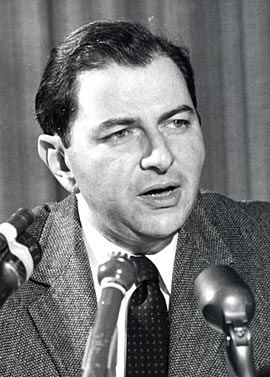UC Berkeley Press Release
Martin Meyerson, former CED dean and acting chancellor, dies at age of 84
BERKELEY – Martin Meyerson, who is credited with defusing some of the Free Speech Movement tensions at the University of California, Berkeley, while serving as acting chancellor in 1965, died Saturday (June 2). He was 84.
The native of New York City also was an authority on urban development and was dean of UC Berkeley's College of Environmental Design (CED) from 1963 to 1965, after CED founder William Wurster stepped down.
 Martin Meyerson (1965 photo) |
Meyerson left the deanship from January to July of 1965 after being tapped by UC President Clark Kerr to serve as acting chancellor, replacing outgoing UC Berkeley Chancellor Edward Strong.
"I was surprised as well as honored to be chosen by Clark Kerr as an acting chancellor of UC Berkeley..." Meyerson said after Kerr's death in 2003. "The tasks we shared in the unchartered academic turbulence of the time changed my life and his life but not our values and interests in universities."
In a baccalaureate address to UC Berkeley's Class of 1966, Meyerson said that "probably no undergraduate class ever has been more admonished or harangued" by professors, parents, the press, politicians and others. The students' campus experience in the 1960s, a period of growing student unrest, included the historic Free Speech Movement and Vietnam War protests.
"Protest without steps toward workable solutions is raw and empty and temporary. It cannot satisfy many except those who are satisfied with a howl of rage," Meyerson told the students. "But protest can provide a new vision. For protest is doubt charged with passion, and both doubt and passion are necessary ingredients of innovations innovations which will provide the real achievements beyond the protests."
A 1966 proclamation issued by the UC Regents commended Myerson as acting chancellor for combining "sensitivity and imagination with leadership in dealing with problems unprecedented at the university," as well as for displaying "patience and diplomacy ... to restore order to the Berkeley campus and to instill in the academic community a new sense of unity and purpose."
Earl "Bud" Cheit, dean emeritus of the Haas School of Business and Edgar F. Kaiser Professor of Business and Public Policy Emeritus, was a member of an emergency executive committee established by the Academic Senate during Meyerson's tenure at California Hall. He recalled Meyerson's close working relationship with the faculty. "The faculty really admired him, they related to him..." Cheit said. "He was an intellectual, and he was interested in ideas and the arts."
Ray Colvig, manager of UC Berkeley’s Public Information Office in 1965, recalled that at an emergency meeting of the Berkeley Academic Senate that year, the Senate adopted a resolution to recommend to the Regents that Meyerson be made permanent chancellor. "It was understood as a very strong vote of confidence," said Colvig. "(The Academic Senate) didn't debate this in the meeting -- it was an automatically accepted idea that they should tell the Regents that this was the opinion of the faculty. (That hire) didn't happen, of course, because the Regents took another view on it, and Meyerson left after a time to go on to another position" as president of the State University of New York at Buffalo, now the University of Buffalo.
Colvig said the UC Berkeley faculty was impressed by Meyerson's "qualities as a leader and the things that he did in that short period of time. He became acting chancellor on the spur of the moment almost, when Strong stepped down. He took on a difficult assignment right in the middle of all that was happening (on campus)" in the mid-1960s.
Meyerson earned his bachelor's degree from Columbia University in 1942 and a Master of City Planning degree from Harvard University in 1949. He began his academic career in 1948, teaching at the University of Chicago and then at the University of Pennsylvania.
During his career, he held a variety of administrative posts in higher education, including serving as the head of the Joint Center for Urban Studies run by Harvard and the Massachusetts Institute of Technology. Meyerson also was acting dean of the Harvard Graduate School of Design and in 1966 became president of what the University at Buffalo.
Meyerson left Buffalo in 1970 to become the fifth president of the University of Pennsylvania, a post he held until his retirement in 1981.
Meyerson wrote several books on urban development and housing. He also served as an advisor to the United Nations on issues in Indonesia, Japan, Yugoslavia, France and West Africa.
He is survived by his widow, Margy Ellin Meyerson; sons, Adam and Matthew; and seven grandchildren. A daughter, Laura, died in 1988.

